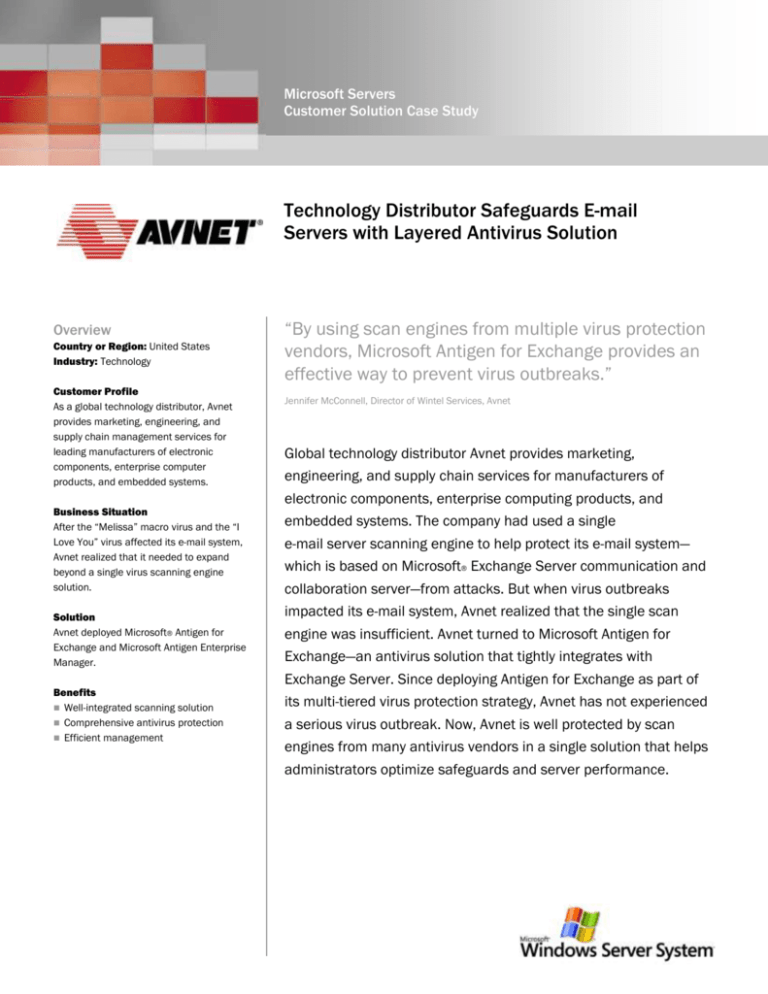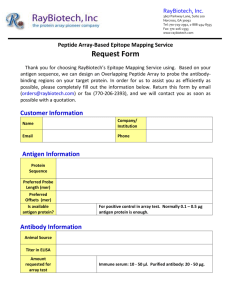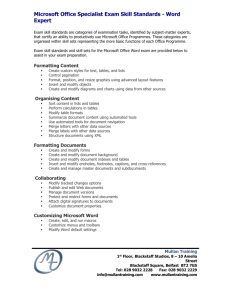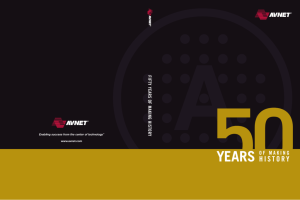
Microsoft Servers
Customer Solution Case Study
Technology Distributor Safeguards E-mail
Servers with Layered Antivirus Solution
Overview
Country or Region: United States
Industry: Technology
Customer Profile
As a global technology distributor, Avnet
provides marketing, engineering, and
supply chain management services for
leading manufacturers of electronic
components, enterprise computer
products, and embedded systems.
Business Situation
After the “Melissa” macro virus and the “I
Love You” virus affected its e-mail system,
Avnet realized that it needed to expand
beyond a single virus scanning engine
solution.
Solution
Avnet deployed Microsoft® Antigen for
Exchange and Microsoft Antigen Enterprise
Manager.
Benefits
Well-integrated scanning solution
Comprehensive antivirus protection
Efficient management
“By using scan engines from multiple virus protection
vendors, Microsoft Antigen for Exchange provides an
effective way to prevent virus outbreaks.”
Jennifer McConnell, Director of Wintel Services, Avnet
Global technology distributor Avnet provides marketing,
engineering, and supply chain services for manufacturers of
electronic components, enterprise computing products, and
embedded systems. The company had used a single
e-mail server scanning engine to help protect its e-mail system—
which is based on Microsoft® Exchange Server communication and
collaboration server—from attacks. But when virus outbreaks
impacted its e-mail system, Avnet realized that the single scan
engine was insufficient. Avnet turned to Microsoft Antigen for
Exchange—an antivirus solution that tightly integrates with
Exchange Server. Since deploying Antigen for Exchange as part of
its multi-tiered virus protection strategy, Avnet has not experienced
a serious virus outbreak. Now, Avnet is well protected by scan
engines from many antivirus vendors in a single solution that helps
administrators optimize safeguards and server performance.
Situation
Avnet, Inc. (NYSE: AVT), is one of the world's
largest business-to-business distributors of
semiconductors, interconnect technologies,
passive and electromechanical components,
enterprise computer equipment, and
embedded subsystems from leading
manufacturers. In 2004, the company was
ranked number three on the
InformationWeek 500. Operating from its
headquarters in Phoenix, Arizona, and more
than 260 locations worldwide, Avnet serves
customers in 70 countries.
“Since deploying Antigen
for Exchange as part of
our multi-tiered virus
protection defense,
Avnet has experienced
no serious virus
outbreaks. As a matter
of fact, we have caught
them all.”
Rob Kudray, Messaging Systems IT Manager,
Avnet
The Avnet Messaging Group supports more
than 9,000 users globally with capabilities
that have grown to include remote access
through Microsoft® Office Outlook® Web
Access and Windows Mobile® powered
smartphones, as well as RIM Blackberry
devices and Internet e-mail. Because a single
virus or worm exploit has the potential to
impact the company and interrupt day-to-day
operations, the Messaging Group must
safeguard Avnet’s expanding messaging
network against exploits.
Avnet has always employed numerous tiers of
defense against virus exploits carried in email messages. One of the components of its
defense was an e-mail server scanning
engine. But after being affected by the
“Melissa” macro virus in 1999 and the “I
Love You” virus in 2000, Avnet realized that it
needed to expand its virus scanning
capabilities.
“After our experience with ‘Melissa’ and ‘I
Love You,’ we knew we couldn’t rely on a
single scan engine. But we didn’t want to
bear the cost and administrative burden of
deploying and managing several,
independent antivirus solutions, nor take the
certain performance hit,” says Rob Kudray,
Messaging Systems IT Manager at Avnet.
Anticipating the advent of increasingly
sophisticated viruses and malicious software,
Avnet sought a solution that would better
safeguard its e-mail system.
Solution
Avnet deployed Antigen for Exchange1 as well
as Antigen Enterprise Manager. Antigen for
Exchange delivers comprehensive serverlevel antivirus protection with a unique,
powerful multiple scan engine management
approach. The layered protection in Antigen
for Exchange offers the most comprehensive
defense available against undesirable and
malicious message traffic.
In early 2006, the company deployed
Microsoft Antigen for Exchange and Microsoft
Antigen Enterprise Manager. Microsoft
Antigen provides advanced safeguards,
increases availability and control, and
secures content.
“Having solid virus protection is critical in
today’s world. We were impressed by
Microsoft’s approach in offering scan engines
from multiple vendors in a single, easily
managed product. By using scan engines
from multiple antivirus vendors, Microsoft
Antigen for Exchange provides an effective
way to prevent virus outbreaks,” says Jennifer
McConnell, Director of Wintel Services at
Avnet.
“Deploying Microsoft Antigen for Exchange
went very quickly—it took merely 30 minutes,”
says Chris Padilla, Senior Messaging Analyst
at Avnet.
Today, the Avnet messaging and
collaboration infrastructure consists of North
American servers and distributed servers for
Asia, all running Microsoft Exchange Server
2003 communication and collaboration
1
In June 2005, Microsoft acquired Sybari
Software, Inc. and its Antigen product line.
server and Microsoft Antigen for Exchange.
Figure 1 illustrates how Microsoft Antigen
currently works with the Avnet infrastructure
to help protect the approximately 1.5 million
e-mail messages that are sent and received
each day.
Figure 1. Avnet’s e-mail
infrastructure relies on Microsoft
Antigen for Exchange.
“Since deploying Antigen for Exchange as part
of our multi-tiered virus protection defense,
Avnet has experienced no serious virus
outbreaks,” says Kudray. “As a matter of fact,
we have caught them all.”
Safeguard for E-mail
Microsoft Antigen for Exchange safeguards
organizations against the latest threats by
managing multiple antivirus scan engines
throughout the e-mail infrastructure. This
approach allows Microsoft Antigen for
Exchange to minimize the average window of
exposure for emerging e-mail threats by
providing continual signature updates from
multiple antivirus labs around the world. The
multiple engine management in Microsoft
Antigen also ensures that Avnet can update
or replace one engine without taking others
offline.
To help safeguard the Avnet e-mail system
against outbreaks, Avnet uses the Microsoft
antivirus engine, included with Microsoft
Antigen for Exchange, and five other engines
on every server running Microsoft Antigen for
Exchange:
Norman Data Defense Systems
Sophos solutions
Computer Associates Vet
Computer Associates IT
Kaspersky
Avnet also uses the Microsoft Antigen for
Exchange WormPurge feature, which uses a
continually updated list of worm signatures to
identify and instantly purge messages that
match known worm signatures. Purging worm
infected messages reduces unnecessary mail
traffic on the network and frees up storage.
Reporting Capabilities
Avnet also uses reporting capabilities and
virus signature distribution features in
Microsoft Antigen Enterprise Manager. Padilla
and his colleagues in the Messaging Group
report to their managers on mail volume,
viruses detected, and virus activity. They also
use the engine versions report to ensure that
virus signatures are up to date.
Benefits
“You need to be thinking ahead of hackers to
make sure you are doing enough to protect
your company,” remarks McConnell.
“Microsoft Antigen, with its multiple scan
engines, helps keep us one step ahead.”
Since deploying Antigen for Exchange as part
of its multi-tiered virus protection strategy,
Avnet has experienced no serious virus
outbreaks. Today, Avnet e-mail administrators
appreciate robust management and reporting
features in Microsoft Antigen Enterprise
Manager as well as automated signature and
scan engine updates.
“With Antigen, we can
focus on monitoring and
managing the
infrastructure, spend
less time on
administrative tasks,
and better support the
business by focusing on
projects that support
Avnet’s growth and
other business goals.”
Chris Padilla, Senior Messaging Analyst, Avnet
Well-Integrated Scanning Solution
Tight integration between Microsoft Antigen
for Exchange and Exchange Server maximizes
availability of the system, optimizes
performance, and provides management
control. “Implementing Antigen for Exchange
initially was very easy and maintenance
continues to be easy,” says Padilla.
“Microsoft Antigen for Exchange is a great fit
in our environment because it works so well
with Exchange Server.”
Comprehensive Antivirus Protection
“Microsoft Antigen for Exchange provides a
critical piece of Avnet’s multiple-tiered virus
protection defense,” remarks McConnell.
Microsoft Antigen for Exchange helps protect
the Avnet e-mail infrastructure from infection
and downtime through an approach that
emphasizes layered defenses and
optimization of Exchange Server performance
and availability. Combining these protection
technologies at multiple layers throughout
the infrastructure helps stop the latest e-mail
threats before they impact business and
users.
The true test came in August 2004, when a
widespread outbreak of the “Bagel” variant
crippled e-mail systems at other companies
worldwide—but not Avnet.
“Avnet avoided any outbreak of the Bagel
variant by using Antigen for Exchange to
clean more than 5,000 potentially infected
messages,” explains McConnell. “Microsoft
Antigen for Exchange is a key weapon in
Avnet’s virus defense arsenal.”
Efficient Management
Microsoft Antigen for Exchange integrates
with Microsoft Antigen Enterprise Manager.
Microsoft Antigen Enterprise Manager is a
web-based console that provides centralized
deployment, quarantine management,
signature updating, SMTP/SNMP alerting,
and reporting. These features reduce
administrative tasks and enable the Avnet
Messaging Group to focus on value-added
tasks and projects. Microsoft Antigen
Enterprise Manager, for example,
automatically retrieves signature updates for
the scan engines and stores them on a
central server and also distributes those
updates to each of the servers running
Microsoft Antigen for Exchange in the
environment.
Avnet e-mail administrators also benefit from
configuration templates in Microsoft Antigen
Enterprise Manager. When they are
configuring a new Exchange Server, whether
stateside or overseas, administrators can
install and configure Microsoft Antigen for
Exchange on that server from a central
location in Avnet’s headquarters. An
administrator can set and save scan engine
settings and performance settings in a
configuration template, and push the
template out to a remote server. Best of all,
the settings can take place in real time,
without having to reboot that server.
“With Microsoft Antigen, we can focus on
monitoring and managing the infrastructure,
spend less time on administrative tasks, and
better support the business by focusing on
projects that support Avnet’s growth and
other business goals,” Padilla concludes.
For More Information
For more information about Microsoft
products and services, call the Microsoft
Sales Information Center at (800) 4269400. In Canada, call the Microsoft
Canada Information Centre at (877) 5682495. Customers who are deaf or hard-ofhearing can reach Microsoft text telephone
(TTY/TDD) services at (800) 892-5234 in
the United States or (905) 568-9641 in
Canada. Outside the 50 United States and
Canada, please contact your local
Microsoft subsidiary. To access information
using the World Wide Web, go to:
www.microsoft.com
Microsoft Windows Server
System
Microsoft Windows Server System is a line of
integrated and manageable server software
designed to reduce the complexity and cost
of IT. Windows Server System enables you to
spend less time and budget on managing
your systems so that you can focus your
resources on other priorities for you and your
business.
For more information about Windows Server
System, go to:
www.microsoft.com/windowsserversystem
For more information about Avnet products
and services, call (480) 643-2000 or visit
the Web site at:
www.avnet.com
Software and Services
© 2006 Microsoft Corporation. All rights reserved. This case
study is for informational purposes only. MICROSOFT MAKES NO
WARRANTIES, EXPRESS OR IMPLIED, IN THIS SUMMARY.
Microsoft, Outlook, the Windows logo, Windows Mobile, and
Windows Server System are either registered trademarks or
trademarks of Microsoft Corporation in the United States and/or
other countries. All other trademarks are property of their
respective owners.
Document published June 2006
Microsoft Servers
− Microsoft Exchange Server 2003
Microsoft Antigen Enterprise Manager
Microsoft Antigen for Exchange
Windows Mobile 5.0 for Smartphones
Technology
− Microsoft Office Outlook Web Access
Hardware
Hewlett-Packard Servers with Quad
processors and 4GB of RAM








